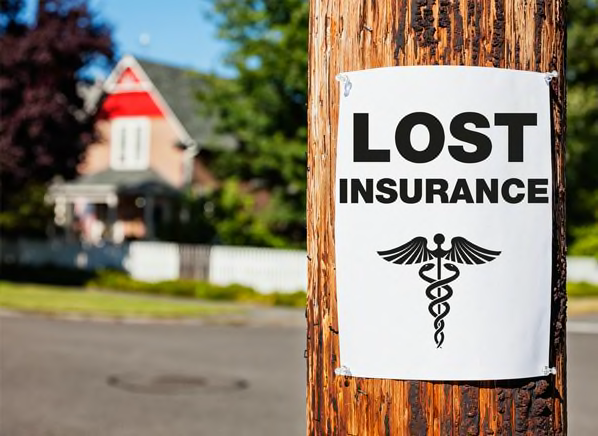Sign In


There are lots of ways to lose your health insurance. You can lose or quit your job, get a divorce, get kicked off your parent's plan when you turn 26, move out of state, come to the end of your COBRA coverage, or have a plan that's being discontinued. In the past, any one of those events could have meant disaster. Now, thanks largely to the Affordable Care Act and other health care reforms, you have more options. Still, there's a lot you need to know. Here are answers to the most common questions about losing your insurance.
You can find it through your state health insurance marketplace. Anyone who needs health insurance can purchase coverage here. If you are not sure how to get started, run through our free interactive online tool, HealthLawHelper, which will point you in the right direction.
Once you register on the marketplace, you can find out whether you qualify for a financial help with your premiums, and out-of-pocket costs. You can then shop for and compare different plans and enroll in the plan of your choice right then and there. Learn more about selecting the right plan for you.
No, you can get new insurance right away.
It is true that under normal circumstances you can't purchase insurance on your own unless it's open enrollment season, which this year runs from Nov. 15, 2014, through Feb. 15, 2015.
But if you are in any of the situations described above (plus several more), you can purchase replacement coverage on the marketplace at any time of year. What to do: log into or create an account on your state's marketplace, then ask for what's called a Special Enrollment Period. Once it's confirmed, you're free to shop for new health coverage.
Here's the full list of "qualifying life events" that allow you to purchase new health insurance any time of year.
Yes. For those who don't know, COBRA is a law from the 1990s that requires most employers to allow departed employees (and their dependents) to stay on their old workplace health plans for another 18 to 36 months. Your COBRA plan will be the exact same plan you had at your old job.
The downside is you must pay the entire cost of the plan while on COBRA, including the part the employer used to pay. It can easily run to $700 a month or more for an individual and more than $1,000 a month for a family.
Starting from the day your regular employer coverage ends (it's usually the last day of the month you left your job, but check to be sure), you have up to 60 days to decide whether or not to take COBRA. If you sign up at any point during that period, your coverage will be retroactive, provided you pay the back premiums.
It depends. During your 60-day grace period you should definitely check out your options on the marketplace to see what kind of financial help you can get, and select some plans you think you might like. When you give your income information to the marketplace, you will also find out whether you may qualify for Medicaid for yourself or CHIP for your children. Then you can compare your marketplace options to the COBRA plan.
In most situations the marketplace plan will probably be cheaper than COBRA. But there are other things to consider, too:
Once you start COBRA, you have to keep it until the next open enrollment period or until the COBRA plan runs out, whichever comes first. So if you start COBRA in, say, March, you will have to keep it until open enrollment comes around. At that point you can replace it with a marketplace plan.
Click on the image at right for rankings of health insurance plans nationwide. Use the tool to:
 Build & Buy Car Buying Service
Build & Buy Car Buying Service
Save thousands off MSRP with upfront dealer pricing information and a transparent car buying experience.
 Get Ratings on the go and compare
Get Ratings on the go and compare
while you shop